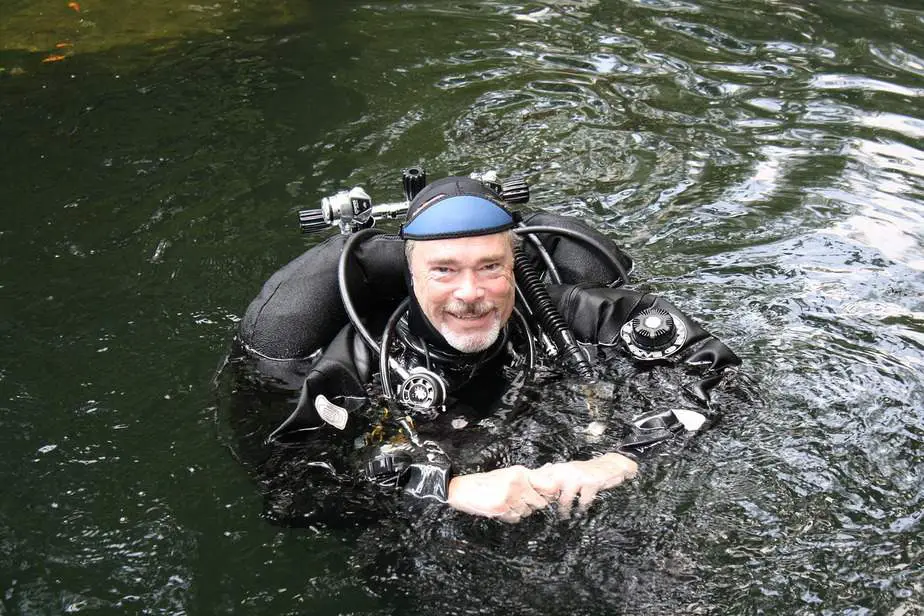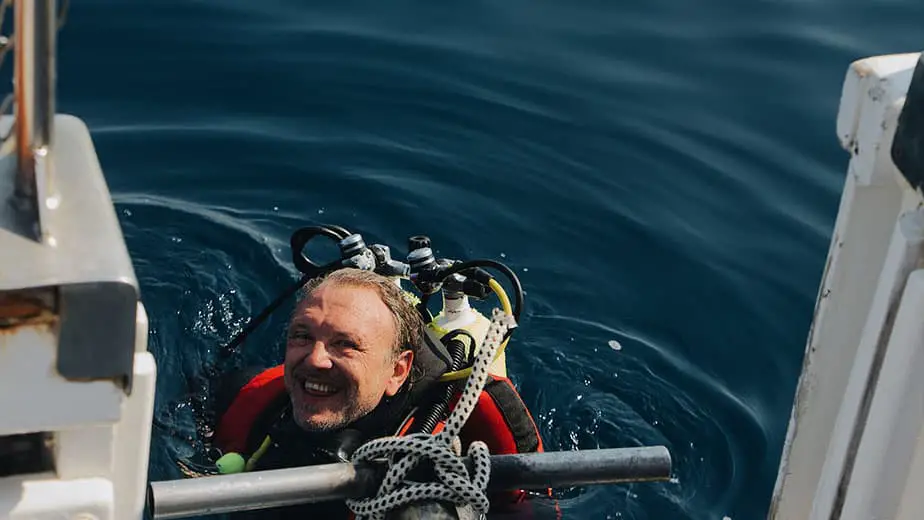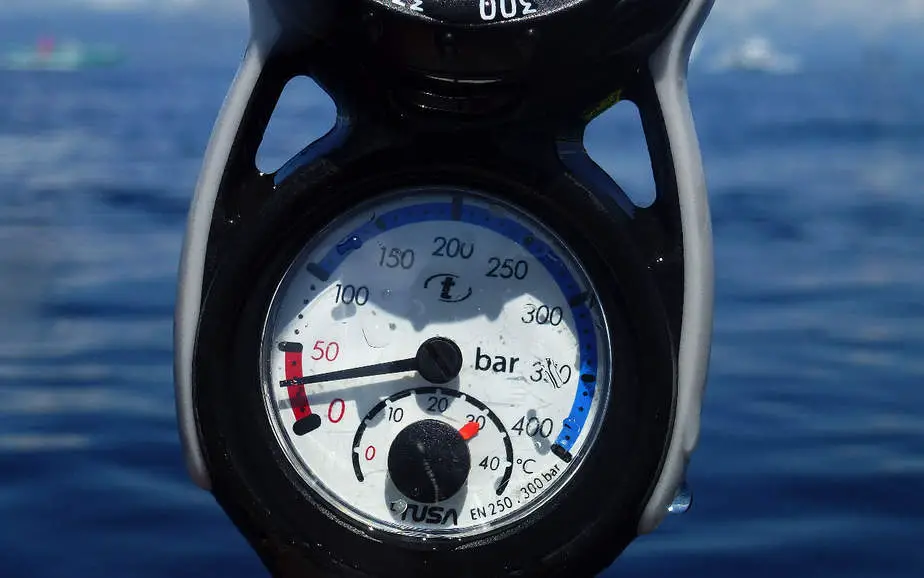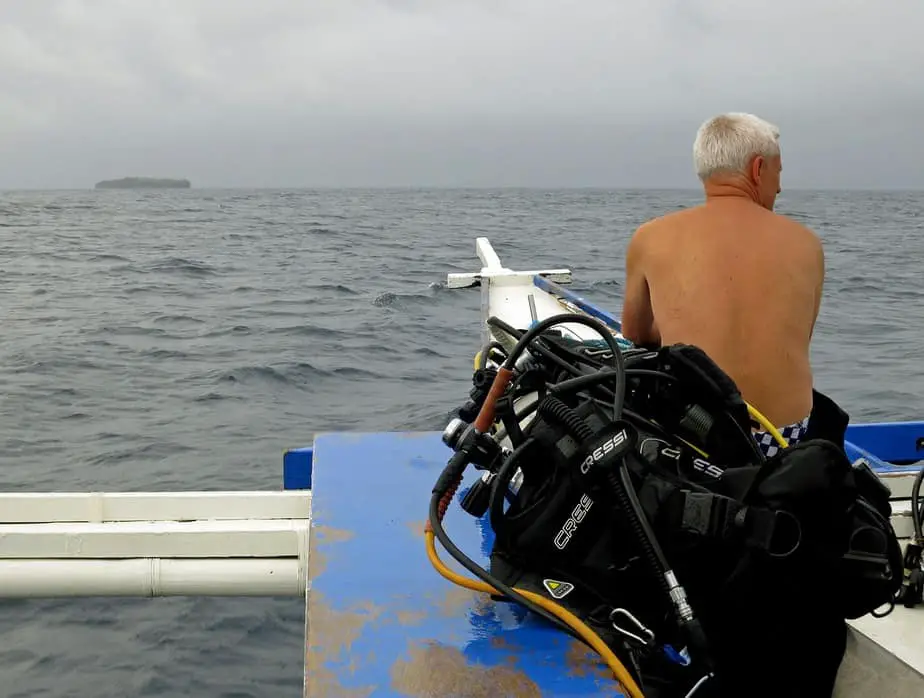With scuba diving’s popularity increasing year by year, now the sport is being exposed to a variety of people across a wide spectrum of age ranges. Officially, the minimum age for scuba diving is 8 years old, and there is no maximum age for this sport. While older divers are defined as being over the age of 50, technically even an 80 year old can start diving today if they want to.
The only restriction imposed on older divers is a practical one – are you physically fit and healthy enough to dive? This question can also be asked of someone in their 20s. Just because you are young doesn’t mean you are fit to dive, and just because you’re over 50 doesn’t mean suddenly you are unfit to dive. This is especially true of older divers who have decades of experience; if anything, they are probably some of the most skilled and capable divers in the world.
In this article, we will discuss what diving is like for an older person, what kinds of risks you are exposed to, and how you can start or continue diving as a diver over the age of 50.
Concerns about veteran scuba divers
When scuba diving started becoming popular four to five decades ago, the safety standards weren’t as strict and equipment wasn’t as good as they are now. The scuba divers from that time who are still diving today are likely getting on in their years. Assuming their health hasn’t taken a sudden turn for the worse and that they still keep physically fit, combined with their vast scuba diving knowledge, then today they are some of the most capable and reliable divers in the world.
In the past, scuba diving was not as well-researched and regulated as it is now. There were fewer rules and standards to follow, which meant diving was riskier. We don’t encourage that kind of risky behavior, however divers from that era who have survived until now are some of the most battle-tested, tough-as-nails people in the diving community.
Unfortunately, some of the bad habits they picked up during that time may start to have a negative impact on them in their old age. Their bodies aren’t as young and strong as they used to be. Pushing themselves physically as hard as they used to or diving to deep depths may take longer for their body to recover from.
They may also be unfamiliar with modern scuba equipment that we currently use which could save them a lot of time and effort (some older divers still swear by their dive watch and dive tables and refuse to use a dive computer). We understand people’s reservations about relying on a computer for their well-being, however you can use a dive computer’s calculations in conjunction with your knowledge about dive tables to get more information to work with.
As safety regulations have tightened up over the years, I have started to see some divers get turned away because they seem to have no regard for the rules and protocols of modern scuba diving.
For instance, I’ve overheard a diver claim that, despite being only certified to dive to 30 m (100 ft), in the past he dove down to 60 m (200 ft) with only one tank of air and no safety equipment. He was shocked that the dive center didn’t let him do that, probably because he used to get away with it in the past. Another common one is a diver who wants to go wreck diving without a wreck diving certification.
These divers from a different era will argue and make a fuss because apparently that’s what they’ve been doing for years. That kind of behavior doesn’t work anymore. Older divers who have not updated their diving knowledge to what’s being taught in modern diving courses will be in for a rude awakening. It’s also a miracle that they have been scuba diving for this long without incident.
Am I too old to scuba dive?

The concerns about scuba diving at an old age mostly applies to people learning how to dive for the first time. To be honest, there is no greater time to start diving than right now. Technological innovations such as modern dive computers have made diving a lot easier and safer for the beginning diver.
If you talk to other divers whether in person or in diving forums, or even call a dive center to ask about people starting diving at an old age, you’ll hear hundreds of stories of someone diving for the first time in their 50s, 60s, 70s, and even 80s. Age is NOT the limiting factor! The only legitimate excuses to not be able to scuba dive are health concerns (e.g. pre-existing medical conditions) and physical limitations, and arguably even some of these may be overcome.
There is a misconception that an older diver will struggle to learn scuba diving compared to a younger diver. That is somewhat true; there is the saying that children’s brains are like sponges with how much information they can absorb. It may take longer for an older person to retain information and master new skills, but you just need to put in the time and the effort.
For instance, an older student may need to repeat a skill more times until they feel comfortable with it. An older student may also be more scared because scuba diving can be quite a nerve-wracking sport for a first-timer, plus they may have a limiting belief that they are too old. Unfortunately, these two factors are a major impediment to an older person learning how to dive. They need to be overcome.
Medical issues
Every legitimate dive center or independent dive instructor will ask all new students to fill out a medical questionnaire. It doesn’t matter if you’re young or old, male or female, if you look fit or out of shape, etc. All new students must fill out this questionnaire.
The form will ask questions about your medical history. In particular, it will ask if you have any medical conditions that affect your heart or lungs, such as but not limited to asthma, sinus surgeries, seasickness, heart problems and so on. This is so that they can determine if you are healthy enough to dive.
There will also be a dedicated section for people over 45 years old asking about history of smoking and family history with attacks. This is because older people are at higher risk of suffering from lung or heart diseases regardless of whether they scuba dive or not, and the aforementioned factors can drastically increase one’s likelihood of having an issue during a dive.
If an individual answers ‘yes’ to any of the questions in the medical form, then you will be required to visit a doctor and get a signed medical statement from them saying that you are healthy enough to dive. If your issue is minor, such as a mild case of seasickness, then you may get the all-clear.
If your case is worse or unclear, then the doctor may refer you to a specialist who can conduct a more thorough examination for issues related to your heart and lungs. The reason why there is a focus on heart and lung issues is because divers will be breathing compressed air and their lungs will be subjected to immense pressure, so even a “minor” problem like asthma can become deadly underwater.
For most people, the dive medical is not an issue. Please fill out the questionnaire truthfully; if something goes wrong during a dive, you are the one who will be in danger. Also, ensure that your diving insurance is valid (you should always have diving insurance, particularly if you’re diving abroad!)
Physical ability

Another major factor older divers need to consider before going scuba diving is your physical ability. One thing to note: if you have a physical disability, you may still be able to scuba dive with extra care from some helpers. Just because you’re missing a limb or two doesn’t mean you can’t scuba dive.
There are people who wear prosthetics on land or who are normally wheelchair-bound and that hasn’t stopped them from diving. These divers are taught differently and adapted to using their hands to aid in propulsion instead of their legs. They’ll use a type of fin designed to be worn over hands to give them an extra boost. If these people can still find a way to scuba dive despite their circumstances, then being a bit older suddenly doesn’t seem like such a handicap.
When a diver is assessed for physical fitness, they are being tested mostly on their endurance. For example, one of the questions in the medical form is whether you have an “inability to perform moderate exercise.” This is because scuba diving does tax the cardiovascular system quite a bit and is a form of exercise.
Additionally, the scuba tank can be quite heavy on land; along with the rest of your scuba gear, you can be carrying an extra 35 pounds of weight or more. Are you able to hold up that weight long enough until the water can give you some relief?
All divers must also be able to perform the basic skills needed to scuba dive. For example, they must be able to clear their mask, remove a weight belt, remove and replace the regulator back into their mouth, and so on.
You’ll remember that the Open Water Diver course has a couple of basic endurance tests. One test was to keep your head above water for 10 minutes without any buoyancy aids. The second test was to swim a distance of 200 m without any buoyancy aid and with no time limit. If you cannot do either one of those things, your endurance is not good enough.
Basically, if you can still do the things taught in the Open Water Diver course, then you are physically fit enough. Successfully meeting these standards means that your heart, lungs, and overall stamina are good enough to do some basic scuba diving.
Things older divers should be wary of
There are some additional factors older divers should keep in mind if they want to safely scuba dive. They are:
Poor eyesight

One of the things that can deteriorate over time is our eyesight. This can negatively impact diving because not being able to read your dive computer and gauges is a serious risk.
To address this, you should consider using prescription dive masks or wearing contact lenses when diving. As for your dive computer and gauges, you’ll need to find ones with larger faces which are easier to read. Dive computers should have a large and bright screen.
If you’re having difficulty reading your consoles, then tell your dive buddy or dive guide that you require assistance during the briefing so they can give you extra attention during the dive.
New concepts
Older divers who got certified decades ago may not be up-to-date on the current standards. There are new safety regulations, new diving theory, and so much new equipment that it’s hard to keep up. At least when it comes to the regulations and theory, they are very important but also overwhelming for the older diver who scuba dived during a simpler time.
If it has been some time since you last went scuba diving, consider taking the ReActivate course to refresh your scuba diving knowledge. Also, try to find a patient dive buddy or instructor who are willing to catch you up on the current diving protocols.
Physical limitations
Older divers know this better than anyone, but as we get older then we may start to lose our ability to do certain things, or do it at the level we used to do when we were younger. It’s a hard pill to swallow, but it’s inevitable. Maybe your endurance isn’t quite what it used to be, your hips and joints creak, your arthritis starts to flare up, and so on.
Older divers need to come to terms that they may not be as capable as they once were. They need to honestly assess their current level and dive cautiously. This is assuming that you were already assessed by the doctor and given the all-clear. Some divers might not even get this far, and their diving career is effectively over. Divers aged 45 and older should get a medical examination every year to ensure they are still fit to dive.
Parting words
While there is no age limitation for scuba diving, there are many factors older divers need to consider before scuba diving. Even though age is not the issue, medical conditions and physical limitations may prevent older people from being able to safely dive again.
If you have medical clearance to dive, you should still be very cautious. Do not feel pressured to keep up with younger divers. Take all of the time you need in order to dive safely. If you feel like your diving knowledge is outdated, try to learn from the other divers or the instructor. If you’ve been diving for decades, it’s possible that some of the best practices have changed.
At the end of the day, diving should be fun for everyone whether you’re young or old. As long as you dive cautiously and believe that you can do it, then there’s no such thing as being too old to dive.


